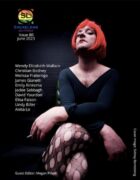“A Sex Fantasy Before I Fall Asleep Next to My Husband” has little-to-no sex. What does this say about the narrator?
In some ways, calling this a sex fantasy is a joke. Actually, it was a joke in When Harry Met Sally. Harry asks Sally to describe her most erotic fantasy, and she says that a faceless man rips off her clothes, and it stops there. To defend herself to the confused Harry, she adds that sometimes the fantasy changes. He asks, “What changes?” She answers, “What I’m wearing.” In the movie, it’s meant to highlight the differences between men and women. Sally (like all women, ostensibly) is particular, controlling, and more interested in clothing than the body. Harry, we’re meant to understand, has pornier, more obviously embodied sex fantasies because he’s a man.
I don’t at all think that the story’s narrator focuses on clothing and romantic, melodramatic narratives because she’s a woman. Or because she’s not interested in sex—quite the opposite. I think there’s something lovely about obsessing over the mundane, in her desperation to get the details right. Something that can get overlooked in explicit sex scenes is how multisensory and specific arousal is. There’s embodied desire in the narrator’s captivation with the rose glow of her imagined lover’s face beneath the sheets, or with the way her hair falls in a specific way across her forehead. I think her preoccupation with detail is indulgent. She’s desperate to be subsumed into the fullness of the scene.
The narrator is also unsettled as to how this fantasy should play out for other reasons, unspoken guilt being one. Can you expound on this?
For the narrator, who really wants to “do nothing wrong,” it’s imperative to consider all of the consequences of her actions—even in her fantasies. And her fantasies make her feel bad, greedy, and ungrateful. She has a husband who she loves, but she also wants this woman from her past. She can’t seem to figure out how to reconcile these two facts. So, to avoid ambiguity, she’s forced to kill people and to create people. As though her own desires can’t fit in this world. This is the saddest element of the story, to me.
Grief is mentioned three times, three different ways. Why is grief so important in this fantasy?
This question made me laugh because, when I finished writing the story, I actually congratulated myself for finally producing something that I felt wasn’t totally colored by grief! I’m working on a novel-in-stories (which includes this one!) that loosely follows a bisexual married couple as they open their marriage before having a baby—so I keep trying to write about sex and sexuality, but I keep accidentally writing about grief. In another story, for example, this narrator finds herself mothering a younger lover as a way to soothe herself after the death of her mother. Even my most graphic sex scenes end up being about loss. To be honest, it’s forced me to rethink how sex and desire function—both in fiction and in my life.
In the final line, here, she suggests that she finds pleasure in putting on grief, which for her is a bit transgressive. She’s a character who likes perfection and the appearance of strength—we can see this in her fixation on getting the details of the fantasy just right.
But grief is messy, unpredictable, and bodily. Sex is always about playing with a hidden side of yourself, leaning into behaviors which are risky or embarrassing or somehow other to you. In this fantasy, she imagines herself as a grieving widow—the imagery is melodramatic. She’s indulging the part of her that is desperate to cry out, to retreat to her bed, to be pitied and soothed, to act on her emotions. I wonder how different that is, really, from fantasizing about sex?
I love the last line! Do you think the narrator actually gets what she wants? Does she know what she wants?
To an extent. I think she’s desperate to feel seen, to be loved, to feel whole, to be good. But these desires are so amorphous that I’m not sure that she could identify them as such. So instead, she’s reduced to wanting broader shoulders, a thinner face, an admission of love and guilt from an ex-girlfriend, a daughter who will love her unconditionally and who looks like a perfect mix of herself and her husband. I think it’s the disconnect between her actual wants and their material manifestations that keeps disrupting the fantasy. All of her waffling—it’s all about the fact that she can’t quite put a picture or a narrative to her deepest desires.
I read on Twitter that you’re expecting twins! Congratulations! Do you think pregnancy has informed your writing? Were you pregnant when you wrote this story?
Thank you! This was the first story I wrote during my pregnancy, at about week twelve. I had a difficult first trimester—I was dealing with extreme exhaustion and prenatal depression. I would find myself lying in bed at night and hyper-focusing on how I should be acting, feeling, and thinking—rather than how I was able to at that time. One morning, I moved from the bed to the couch and I wrote this story. To an extent, writing it was a way of exorcizing my own fantasies about what pregnancy might look or feel like. I didn’t have the perfect belly that the narrator imagines—and the babies didn’t feel like a protective talisman for my sense of self, as the narrator thinks her baby might be. I think her romantic pregnancy fantasies are really funny, actually—and it helped me to laugh at them (and at myself). I’m so happy that the editors of SmokeLong saw something valuable in this story. It was incredibly meaningful to me to have it accepted as my first story publication at that moment when I felt so afraid I had lost something of myself.



 The SmokeLong Grand Micro Contest (The Mikey) is now an annual competition celebrating and compensating the best micro fiction and nonfiction online.
The SmokeLong Grand Micro Contest (The Mikey) is now an annual competition celebrating and compensating the best micro fiction and nonfiction online.